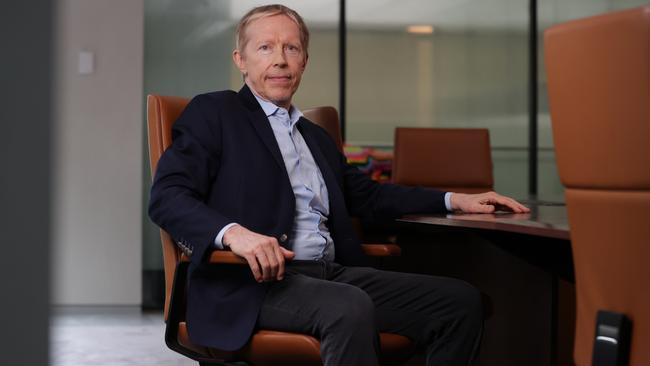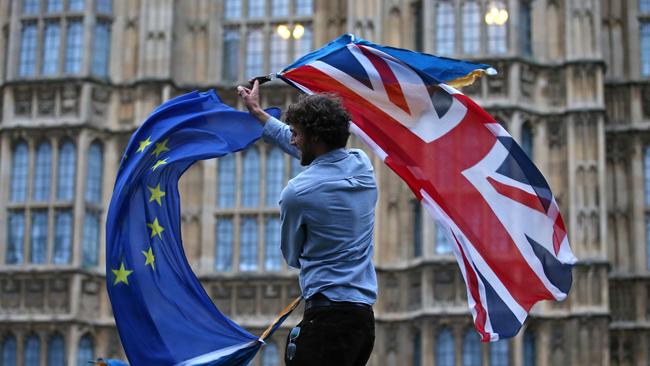Why Millennials will disrupt Trump and the markets, but you will have to wait
If the state of the world makes you nervous then the man who co-authored the term millennials has some good news – civility and rationality will return because the generational instability is cyclic.

Business
Don't miss out on the headlines from Business. Followed categories will be added to My News.
Welcome to the age of crisis and strap in for a rocky ride.
However, according to best-selling US author and historian Neil Howe it’s not all bad news because millennials are poised to come to our rescue.
Howe spent a lifetime analysing and writing about the cyclical patterns of societies and generations. And since the release of a landmark book he co-authored in the 1990s – The Fourth Turning – he has been pursued by big, serious investors and even the US military, for his view about how to make sense of it all.
It was Howe and his then co-author, William Strauss (who died last decade) who coined the term “millennials” – those born between 1982 and 2004 – as part of their study of generations.
And whether it has been millennials, gen Xers, baby boomers or the silent generation (those born between 1928 and 1946), Howe has been documenting the rise of generations and finding remarkable patterns through their cyclical rise and fall.
Howe has mapped out generational cycles of roughly 80 to 100 years and within that there are four “turnings”, rather like seasons, that follow each new generation coming of age.
The first is a “high”. This is a spring-like period of strengthening institutions and global order – think post-World War II.

The second is an “awakening”, which an era of increasing individual and civic upheaval, questioning authority and Where Baby Boomers were coming of age in the 1960s.
The third phase is “unravelling” much like the end of communism, rising individualism and weakening of institutions. This coincides with gen Xers maturing from the mid-1980s until the global financial crisis.
The fourth and final phase which is one of “crisis” represents a winter period of major secular upheaval and a loss of faith in institutions.
It is marked by the rise of partisan politics at the extremes and movements like Brexit or Trumpism. It involves a reworking of values and civic order with a new one.
According to Howe, the same four patterns can be found in US history going back hundreds of years, taking in the Civil War and American Revolution.

“We tend to think about the future is just utterly random and people find that terrifying,” Howe says. “What they want to know is are there any long term rhythms here?”
Howe is speaking to The Weekend Australian in Sydney, fresh from a session with the $270bn-plus Future Fund. He has a full week of meetings with other big investors and funds ahead of him. An economics and history graduate of Yale, Howe has worked with names like asset management giant Blackstone and US government agencies.
Where he intersects with markets is when investors attempt to track how shares and bonds behave during Howe’s turning periods.
For example, the last “fourth turning” coincided with the Great Depression and World War II.
Generation nation
Howe and Strauss started looking to common cohorts of generations in the early 1980s. They built on the work of a novel published by Douglas Coupland called generation X that gave a name to the people born in the mid 1960s until the late 1970s.
But it was his work on the millennial generation that fired up the interest of the US military. Its recruitment methods simply weren’t working.
Howe remembers a meeting with top US military officers, who were struggling to drum up interest in the army among high school graduates.
The extreme action advertising akin to gladiators with swords and the adventure pitch (think X Games) that had worked so well for years was falling flat.
Howe recalls how the battle-hardened generals were perplexed, telling him: “We got these young kids coming in the recruiting office – and they’re bringing their mums with them.
“They absolutely couldn’t compute this,” Howe says.
The reason the younger people were turning off was the recruitment appeal had been built around risk taking and battles. It was full of bravado and aimed at the downtrodden kids who wanted the opportunity to have real challenge and excel.

“Millennials were terrified by these ads and machismo,” Howe says. “Suddenly you had these kids who really wanted teamwork, co-operation and were all about ‘how are we going to get a big job done’?”
It was a confronting moment for the US military and was the start of a huge undertaking involving a cultural shift to adapt to the new class of young. It wasn’t just around recruitment, but right through to retention and promotion.
But are these generational differences real?
Howe points out that millennials grew up in the age of the “baby on board” car sticker. They spent their short lives being protected and fussed over. Think seat belts, diet and health advice, location apps and baby cameras.
There was an expectation that institutions would also take greater responsibility for their broader wellbeing.
Many teenagers today have rarely experienced a moment when an adult doesn’t know where they are, Howe says.
It’s themes like this that also have big implications for employers.
“Gen X was built on an economy where you want to catch everything as quickly as you can,” he says. “You don’t trust your employer, but that’s okay – they don’t trust you and that’s the bargain.
“Millennials are very different. Millennials were looking for someone actually to support them, look after them, give them benefits, not necessarily cash, but have a deeper, longer-term relationship with their employer.”
What role does technology play? Howe believes the impact of tech is often looked at the wrong way.
“What’s more interesting to me is, not so much how technology shapes generations, but a really more interesting and productive point of view is how do generations shape technologies?” he says.

For example, it was boomers like Steve Jobs or Bill Gates who championed computers for individuals over corporations. Millennials were a master of technology driving social media.
Turn, turn, turn
Howe’s latest book, The Fourth Turning is Here, as the title suggests puts us well into the “crisis” phase and it going global.
Events like a reversal of globalisation, the political disruption of former US president Donald Trump and the rise of politics at the extremes will continue, the book predicts. Indeed, just this month, the far right swept European elections.
The upcoming US election – which Howe points out is also a generational battle between Joe Biden (silent) and Trump (baby boomer) – is another marker on the road of this crisis.
Biden represents the last of silent generation leaders who valued stability and improving the system, whereas Trump was part of a movement of opposing the prevailing cultural norms, resisting authority and breaking systems. Someone like Trump “just wants creative destruction,” he says.
The bad news is the crisis era will last until the 2030s – until the twilight of the boomers.
The good news is there’s light at the end of the tunnel as the generational cycle turns to the “high” period.
Howe, who is a gen-Xer, puts a lot of political stock in millennials, who he likens to the “hero” or “GI generation” born between the World War I and the Great Depression.
So too is the term “homeland generation” which is coming in the footsteps of millennials. This cohort, born after 2005, has spent a life being shaped by war on terror and the global pandemic and they will resonate with themes like nationalism, localism and a return to roots.
“Generation X were never attracted to politics. They tend to be very libertarian. They don’t trust big institutions,” Howe says.
“They think most stuff that really matters happen is at a small, individual level. We’ve never seen a generation so slow to run for office and to have such low voter participation rates.
“Millennials have it in their nature to be much more gravitated to public office. They’re just still too young from a top leadership perspective.
“We’ll have a first turning again – a time of relative equality and authority where people actually follow the rules. You will have a lot of the things we don’t have today, a sense of collective progress, a sense of trust.
“People won’t feel as alone any more, which seems to be gripping the world today.
“These are all aspects of the crisis era – but they’ll be solved”.
More Coverage
Originally published as Why Millennials will disrupt Trump and the markets, but you will have to wait





